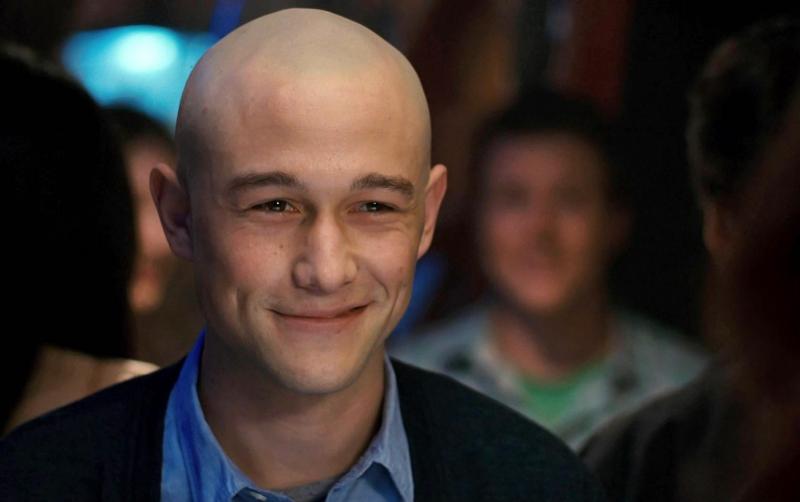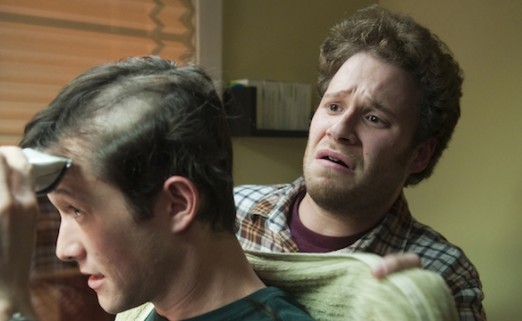50/50 | reviews, news & interviews
50/50
50/50
A terminal illness movie which would rather we laughed than cried

It’s always struck me as an odd sort of desire: to go to see a movie in which you know someone is going to die a long and painful death, while someone else – or maybe a whole gaggle of people – stand and watch, shedding tears and beating breasts. Of all genres, the “terminal illness movie”, if we can call it that, seems altogether perverse.
We see a romantic comedy because we all hope to be in love again, and find it helpful to laugh about the times we thought we were and botched it; sci-fi fuels our imaginations and desire for wonderment; action movies and war films get the adrenalin pumping and act as a valuable antidote to the dreary, sedentary day-to-day; horror films probably keep our own sociopath in check; any number of other genres fulfil that fundamental function of cinema: escapism.
But what’s the point of the TIM? Of Stepmom or Dying Young? What sort of urge does it fulfil? For those who don’t wish to be manipulated, the tear and the jerk might seem rather appalling. If you’ve actually lost someone dear to you in real life, surely you don’t wish to be reminded of the experience by a popcorn movie; and if you haven’t, yet, why would you want to anticipate such an inevitable bummer?
Aren’t we just a bit sick of self-knowledge in the movies?
That’s not to say that there aren’t some decent TIMs out there. Philadelphia wasn’t bad, though the value was in the courtroom and the abrasive tackling of bigotry, rather than the unbearably solemn audience around AIDS victim Tom Hanks; Terms of Endearment had a whole lot going on – life and relationships and Jack Nicholson – before the Big C reared its ugly head; Whose Life Is It Anyway?, not exactly a TIM, but with premature death certainly the aim, offered a splenetic, stimulating argument for euthanasia, and featured Richard Dreyfuss in his pomp.
But one can summarise the woes of this genre in two words: Love Story. By cutting down a young beauty in her prime, leaving her equally beauteous beau bereft, their tragedy shot and scored with such exquisite melancholy, this movie has a great deal to answer for; and I’m not just thinking of Ali McGraw.
And so to 50/50, a TIM which belongs to the sub-genre “cancer movie” and seems to acknowledge its dodgy heritage while doing its best to subvert every morbid, morose and dreary aspect of it. This ticks the boxes – imminent death, the callow lover who can’t stand the heat and the best friend loyally standing by, the hair loss, the pet hound, the adventures in narcotic avoidance. But the “treatment” – not of the main character, but of the genre itself – is refreshingly left field.
Watch the trailer to 50/50
Significantly, it’s based on a true story. Will Reiser was a producer on Da Ali G Show in the States when he was diagnosed with cancer, a giant tumour growing along his spine. His colleagues on the show, Seth Rogen and Evan Goldberg, encouraged him to write about his experience, and have been instrumental in taking that story to the screen – Goldberg as a producer, and Rogen, who has since become the leading light of a new generation of screen comedians, as star.
Closeness to such material could have led to a disaster, of course. But coming from an irreverent comedy background has served Reiser well. Now recovered, he’s been able to see the absurd in his situation, as well the outright frightening. In a way, what he’s come up with is a sort of cancer procedural, an A-Z of the experience of dealing with the disease, practically and emotionally; and that includes handling not just your own responses, but those of the people around you.
That fine young actor Joseph Gordon-Levitt, whose star has been slowing rising since another atypical genre film, the romantic comedy 500 Days of Summer, is Adam Lerner, an earnest young man who works on a Seattle radio station, and one day finds that an irksome backache represents a life-threatening condition. At 27, he’s told that he has a 50/50 chance of survival.
 When he informs his best friend Kyle (Rogen, pictured right with Gordon-Leavitt) of that statistic, the response is, “If you were a casino game, you’d have the best odds,” delivered with that blend of sincere buffoonery that is at the root of Rogen’s comic persona. Kyle is a tough character to read, deliberately so: on the one hand, you sort of know he’s got Adam’s back, that he will do what he can for his friend; on the other, he immediately sees the potential to use the cancer in the same way that men might use babies and everyone uses dogs (in the movies, anyway), namely to get laid.
When he informs his best friend Kyle (Rogen, pictured right with Gordon-Leavitt) of that statistic, the response is, “If you were a casino game, you’d have the best odds,” delivered with that blend of sincere buffoonery that is at the root of Rogen’s comic persona. Kyle is a tough character to read, deliberately so: on the one hand, you sort of know he’s got Adam’s back, that he will do what he can for his friend; on the other, he immediately sees the potential to use the cancer in the same way that men might use babies and everyone uses dogs (in the movies, anyway), namely to get laid.
Kyle wants both Adam and himself as the “caring best friend” to benefit from the sympathy of female strangers; he doesn’t realise that having a tumour the length of his spine makes the deed somewhat painful for his pal. But he is more astute about the calibre of Adam’s girlfriend (Bryce Dallas Howard), who has bailed pretty early on. And his amiable presence makes the journey of recuperation easier for Adam, and us; the film may not be laugh-out-loud, but Rogen’s presence gives the film its unusual buoyancy.
Elsewhere, we have a number of well-observed figures, from the cancer consultant who, like so many in these positions, can’t even look his patient in the face and is comfortable talking only about facts, not feelings, to the trainee therapist with the opposite problem – full of innate compassion, but with no idea how to channel it. Then there’s Adam’s mother, Diane, beautifully played by Anjelica Huston, a woman already caring for a husband with Alzheimer’s and whose immediate, intense desire to throw herself into her son’s illness merely alienates him.
There is a sweet point here, which is that these key people in Adam’s life – his mother, his friend, his therapist – may fall short in the details of helping him, but they do fulfil the most important characteristic: they care, a lot. So while the plot deals with the mechanics in Adam’s life – the chemo, the death of fellow patients, the make-or-break operation, facing the possibility of death – his “journey” is not towards recovery, or even self-knowledge (aren’t we just a bit sick of self-knowledge in the movies?) but simply a better appreciation of those around him.
OK, we know that 50/50 will have a happy ending; nevertheless, it still could have wrung the life out of us on the way there. It doesn’t. The film is hardly revolutionary. But it is smart, and gentle, and resolutely doesn’t give a hoot if we cry, as long as we laugh. For a cancer movie, that’s quite invigorating.
- 50/50 is on general release now
Share this article
Add comment
The future of Arts Journalism
You can stop theartsdesk.com closing!
We urgently need financing to survive. Our fundraising drive has thus far raised £49,000 but we need to reach £100,000 or we will be forced to close. Please contribute here: https://gofund.me/c3f6033d
And if you can forward this information to anyone who might assist, we’d be grateful.

Subscribe to theartsdesk.com
Thank you for continuing to read our work on theartsdesk.com. For unlimited access to every article in its entirety, including our archive of more than 15,000 pieces, we're asking for £5 per month or £40 per year. We feel it's a very good deal, and hope you do too.
To take a subscription now simply click here.
And if you're looking for that extra gift for a friend or family member, why not treat them to a theartsdesk.com gift subscription?
more Film
 Can I get a Witness? review - time to die before you get old
Ann Marie Fleming directs Sandra Oh in dystopian fantasy that fails to ignite
Can I get a Witness? review - time to die before you get old
Ann Marie Fleming directs Sandra Oh in dystopian fantasy that fails to ignite
 Happyend review - the kids are never alright
In this futuristic blackboard jungle everything is a bit too manicured
Happyend review - the kids are never alright
In this futuristic blackboard jungle everything is a bit too manicured
 Robert Redford (1936-2025)
The star was more admired within the screen trade than by the critics
Robert Redford (1936-2025)
The star was more admired within the screen trade than by the critics
 Blu-ray: The Sons of Great Bear
DEFA's first 'Red Western': a revisionist take on colonial expansion
Blu-ray: The Sons of Great Bear
DEFA's first 'Red Western': a revisionist take on colonial expansion
 Spinal Tap II: The End Continues review - comedy rock band fails to revive past glories
Belated satirical sequel runs out of gas
Spinal Tap II: The End Continues review - comedy rock band fails to revive past glories
Belated satirical sequel runs out of gas
 Downton Abbey: The Grand Finale review - an attemptedly elegiac final chapter haunted by its past
Noel Coward is a welcome visitor to the insular world of the hit series
Downton Abbey: The Grand Finale review - an attemptedly elegiac final chapter haunted by its past
Noel Coward is a welcome visitor to the insular world of the hit series
 Islands review - sunshine noir serves an ace
Sam Riley is the holiday resort tennis pro in over his head
Islands review - sunshine noir serves an ace
Sam Riley is the holiday resort tennis pro in over his head
 theartsdesk Q&A: actor Sam Riley on playing a washed-up loner in the thriller 'Islands'
The actor discusses his love of self-destructive characters and the problem with fame
theartsdesk Q&A: actor Sam Riley on playing a washed-up loner in the thriller 'Islands'
The actor discusses his love of self-destructive characters and the problem with fame
 Honey Don’t! review - film noir in the bright sun
A Coen brother with a blood-simple gumshoe caper
Honey Don’t! review - film noir in the bright sun
A Coen brother with a blood-simple gumshoe caper
 The Courageous review - Ophélia Kolb excels as a single mother on the edge
Jasmin Gordon's directorial debut features strong performances but leaves too much unexplained
The Courageous review - Ophélia Kolb excels as a single mother on the edge
Jasmin Gordon's directorial debut features strong performances but leaves too much unexplained
 Blu-ray: The Graduate
Post #MeToo, can Mike Nichols' second feature still lay claim to Classic Film status?
Blu-ray: The Graduate
Post #MeToo, can Mike Nichols' second feature still lay claim to Classic Film status?

Comments
Good review. The film blends
it's not about making fun of